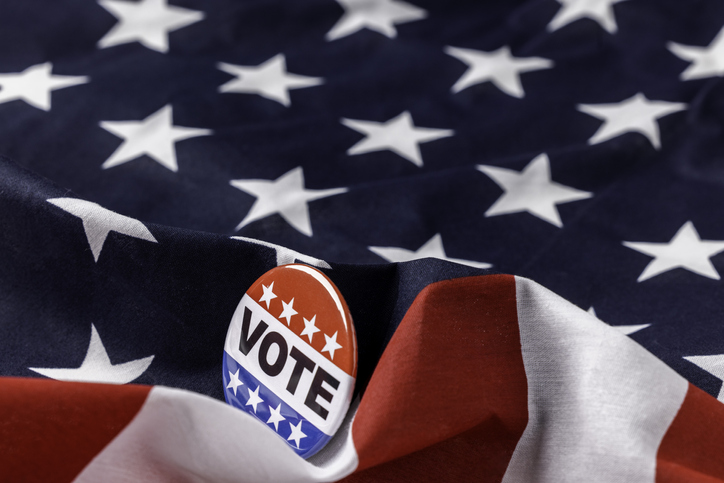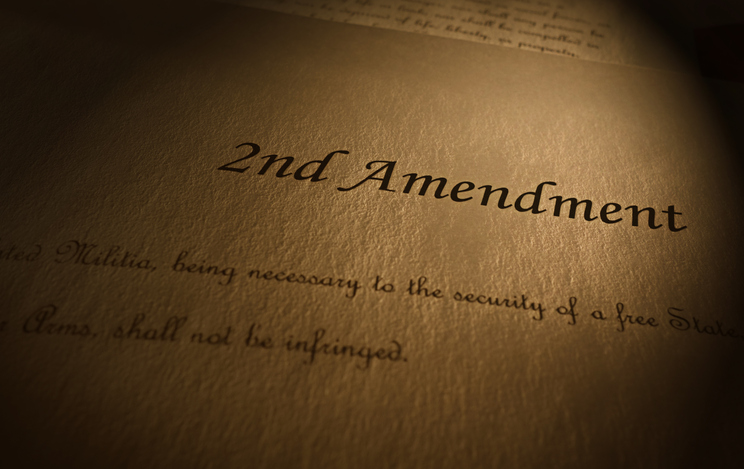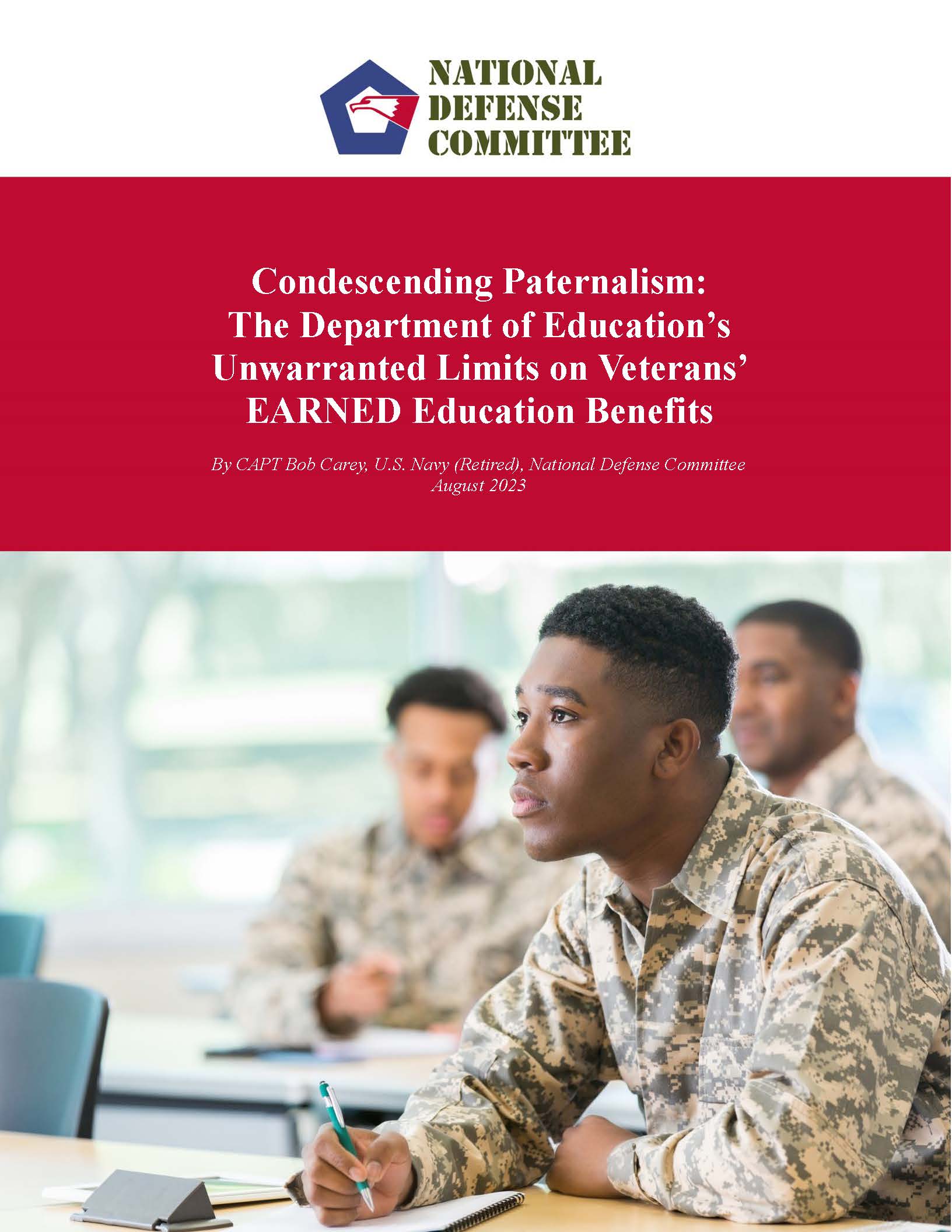Established twenty years ago, the National Defense Committee is a veteran-serving advocacy and service organization focusing on legislative, regulatory, and public policy reforms in voting rights, health care, higher education, the Second Amendment, and select other issues.

Protecting military and veteran voting rights and the protection of the integrity of the military and veterans’ votes by ensuring free and fair election administration.
Military voter participation is important yet, we have seen that military participation is much lower than that of the general public. By working to increase military voter participation rates it will enfranchise hundreds of thousands of military voters.
In a 2006 case study, numbers showed that the military voting age population voted only at 20.4% compared to 38.9% of the general public. It’s important to highlight that the absentee ballot return rate for the same two population groups was severally different, with the general public having a return rate of 85.5% compared to only 25.5% from the military population.
Potential Solutions:
A three-part strategy is necessary to bring about the substantive reform necessary to improve military voter participation:
Resources:
Our goal is to maximize military and veteran choice in health care delivery systems, whether it be at a VA or military treatment facility, or at a private sector or other government agency. In our work we have seen three important issues areas: caregiver, VA Health Care, and DoD Health Care.
Caregivers
Repeatedly, we hear similar stories from distraught Caregivers and Veterans, dealing with the day-to-day challenges of their disabilities, who suddenly find themselves without financial support or health insurance for the Caregiver, due to inexplicable determinations by VA officials. Often, we are told those cases are unique deviation from established VA policy. But at some point, such deviations become the norm and indicate serious problems with the execution of the program.
In 2018, we joined others in submitting recommendations to the VA:
- Establish, and enforce, national eligibility standards for the Caregiver program, that apply to both initial eligibility determinations and to the annual eligibility reevaluations.
- Establish a permanent Caregiver designation for our most catastrophically disabled veterans, so they and their Caregivers do not have to go through the continuous worry of being downgraded within the program or dropped from it altogether.
Resources:
DoD Health Care
Nearly 15,000 local and independent pharmacies have chosen to no longer participate in the TRICARE pharmacy program. We call on the Department of Defense to immediately reverse the changes to the TRICARE program which led to the mass exodus of these pharmacies; and if the Department of Defense is unable or unwilling to do so, we call on Congress to adopt a legislative solution in the FY 2023 National Defense Authorization Act.
Under current practices, Express Scripts acts as a pharmacy benefit manager for the TRICARE program while serving as a mail-order and specialty pharmacy itself. Without question, this poses a conflict of interest that must be reconciled to ensure TRICARE is compliant with federal procurement law and provides for additional competition in the marketplace to drive down costs and expand options for beneficiaries.
Resources:
For over a decade the Department of Education has suggested that career colleges overcharge naïve military veterans with worthless educational programs used to feather their own pockets at the expense of the U.S. government and the veteran students. But the fact is, many veterans don’t go, or can’t get into, private nonprofit schools, and for many of the more elite schools, they are not welcome. Alternatively, career colleges provide an open and inviting door to these military and veteran students, with flexible educational setting which works with their busy personal and professional lives, and do not hide behind a veneer of exclusivity to keep veteran students at arm’s length.
Click here to read NDC’s briefing paper:
#1. Traditional Universities are in Decline.
Traditional colleges and universities look a lot like lucrative businesses that generate their own form of profits, have scores of employees earning millions of dollars per year, and run highly profitable sports programs which in any other country or setting in the United States would be professional sports leagues. Further, these traditional universities fight tooth and nail to protect their entitled position, engaging heavily in partisan political campaigns (especially for sympathetic Democratic Members of Congress), and aggressively lobbying those same Members of Congress to protect their unique tax-exempt status for their exclusive and huge endowment income.
#2. Military and Veteran Students Choose Innovative Career Colleges Over Traditional Universities. Veterans are Not Fooled; They are Not Dumb.
Veterans pick career colleges because of the ease and usefulness to their busy personal and professional lifestyles, an accepting student body, educational programs focused on real-world job skills, and a relative positive value, especially for military and veteran students.
#3. Politicians Protect Traditional Higher Ed’s Advantages, Through Biased Regulations on Career Colleges.
The traditional universities’ compliant elected officials see the statistical decline of traditional universities as well as anyone, and therefore work to safeguard Traditional Higher Ed by applying restrictive limitations that apply to career colleges only. The “Gainful Employment” and “90/10” Rules are the most recent examples. Many traditional Higher universities would fail if subjected to the same regulatory red-tape.
#4. “Regulatory Activism” Exposed with One Veterans Advocacy Group’s Unethical Campaign at the Department of Veterans Affairs.
While some advocacy groups argue they are there to “protect” apparently ignorant and naïve military and veteran students from so-called deceptive career colleges, their alliance with biased bureaucrats and similarly protectionist organizations perpetuates an attitude of condescending paternalism towards veteran students. Mostly backed by one wealthy funder, one advocacy group went so far as to engage in unethical practices at the VA.
Resources:
We work to protect military personnel and veterans’ inalienable rights to purchase, possess, and use firearms with minimal government interference.

On July 18, 2023, Captain Bob Carey, U.S. Navy (Ret.) gave a testimony before the House Committee on Veterans Affairs.
He highlighted the fact that “the Department of Veterans Affairs (VA) has indiscriminately abrogated veterans’ inalienable rights for decades, not only the right to keep and possess arms (as is supposed to be protected from such federal government overreach by the Second Amendment), but those veterans’ due process rights which are similarly supposed to be protected from such government overreach by the Fifth and Fourteenth Amendments.”
Reform the VA Fiduciary Rule
Background: The VA’s Fiduciary Program allows VA rating officials and health care providers, without any judicial oversight, to involuntarily refer a veteran to the fiduciary program. Once referred to the program, the veteran has 60 days to prove to the VA they are, in fact, competent to handle their VA benefits – the burden of proof falls to the veteran to prove they are competent. Once placed in the fiduciary program, the veteran is then reported by VA to the Department of Justice to be placed on the National Instant Criminal Background Check System (NICS) as a “mental defective”, after which the veteran is informed they are no longer allowed to purchase or possess firearms.
The Issue: The VA’s fiduciary process does not meet the legal standard for adjudicating an individual as a “mental defective” under the Brady Gun Control Act (from which the requirement to report to the NICS database arises) and the veterans placed in the fiduciary program should never be reported to the NICS database.
Discussion: By setting up such disincentives for veterans to seek mental health care from the VA, the VA is driving the very veterans who should be seeking mental health care away from the system. Because of the fear of losing their firearms, which 46% of veterans own, many veterans do not seek the mental health care they need. Over half the post-9/11 combat deployed veterans who need mental health care treatment do not use either VA or non-VA mental health care services.
The National Academies of Science, Engineering, and Medicine stated a significant reason these veterans are not seeking these mental health care services is because they will lose their guns, or other legal or administrative actions will be taken against them for seeking mental health care such as loss of security clearance or loss of child custody. The rate of increase in veterans suicides NOT in the VA health care system is almost 200% higher than for veterans who ARE in the VA health care system.
Resources:
ATF Pistol Brace Regulation Hurting Disabled Veterans
What is a Pistol Brace?: They are accessories that attach to the back of a gun and strap to the forearm, anchoring and lengthening the weapon and allowing the shooter to shoot one-handed more easily. They were invented in 2012 by Alex Bosco, a USMC and Army vet, to help a disabled veteran shoot an AR-15 more accurately.
The ATF is exercising extreme Executive Branch powers overreach in unilaterally declaring pistol braces as the equivalent of short-barreled rifles. They are not. Instead, pistol braces are compensatory accommodation devices for disabled U.S. citizens to exercise their fundamental natural “right to keep and bear arms” safely and securely by stabilizing the use of a handgun where they would not otherwise have full use of both hands.
If a disabled veteran brings such a pistol brace to a legally operating gun range as of June 1st, 2023, and is acting in a legal manner in all other respects, they are subject to arrest by the ATF, a criminal fine of $250,000, and incarceration in federal prison for 10 years—all because they wished to more safely and securely exercise their inalienable rights to keep and bear arms.

